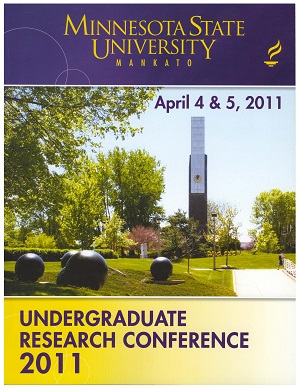Surveying College Students About Their Pereceptions of Test Accommodations
Location
CSU 201
Start Date
4-4-2011 1:30 PM
End Date
4-4-2011 3:00 PM
Student's Major
Psychology
Student's College
Social and Behavioral Sciences
Mentor's Name
Carlos Panahon
Mentor's Department
Psychology
Mentor's College
Social and Behavioral Sciences
Description
Test accommodations are commonly defined as a change in the way that a test is administered or responded to by the person tested and are intended to offset or "correct" for distortions in scores caused by a disability (McDonnell, McLaughlin, & Morison, 1997). Under the Americans with Disabilities Act (ADA) and Section 504 of the Rehabilitation Act of 1973, individuals with disabilities are guaranteed certain protections and rights to equal access to programs and services. Since test accommodations have been available teachers, parents, and students with or without disabilities have formed several perceptions. For example, some people believe test accommodations are too difficult for students to utilize. Others believe some students take advantage of test accommodation which could lead to a differential boost effect (Fuchs & Fuchs, 2001).
Unfortunately, there has not been any research about the perceptions of college students on test accommodation. Therefore, the objective of this study was to determine if there are similarities or differences in perceptions between students with or without test accommodations. Current undergraduate students enrolled in psychology courses at MSU, Mankato were surveyed about their knowledge of test accommodations and their perceptions regarding test accommodations. Descriptive analyses were conducted on all completed surveys. Results regarding the perceptions of test accommodations for students with and without learning disabilities will be discussed.
Surveying College Students About Their Pereceptions of Test Accommodations
CSU 201
Test accommodations are commonly defined as a change in the way that a test is administered or responded to by the person tested and are intended to offset or "correct" for distortions in scores caused by a disability (McDonnell, McLaughlin, & Morison, 1997). Under the Americans with Disabilities Act (ADA) and Section 504 of the Rehabilitation Act of 1973, individuals with disabilities are guaranteed certain protections and rights to equal access to programs and services. Since test accommodations have been available teachers, parents, and students with or without disabilities have formed several perceptions. For example, some people believe test accommodations are too difficult for students to utilize. Others believe some students take advantage of test accommodation which could lead to a differential boost effect (Fuchs & Fuchs, 2001).
Unfortunately, there has not been any research about the perceptions of college students on test accommodation. Therefore, the objective of this study was to determine if there are similarities or differences in perceptions between students with or without test accommodations. Current undergraduate students enrolled in psychology courses at MSU, Mankato were surveyed about their knowledge of test accommodations and their perceptions regarding test accommodations. Descriptive analyses were conducted on all completed surveys. Results regarding the perceptions of test accommodations for students with and without learning disabilities will be discussed.
Recommended Citation
Sanz, Amber L.. "Surveying College Students About Their Pereceptions of Test Accommodations." Undergraduate Research Symposium, Mankato, MN, April 4, 2011.
https://cornerstone.lib.mnsu.edu/urs/2011/oral-session-07/3




